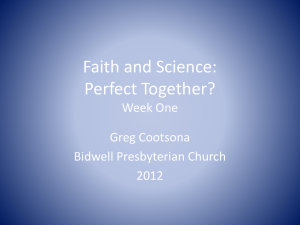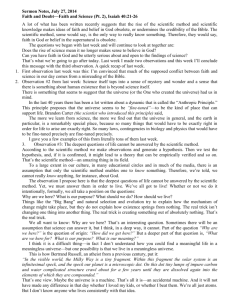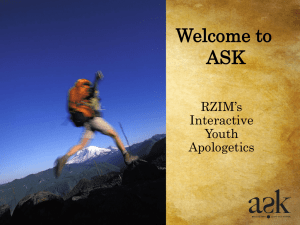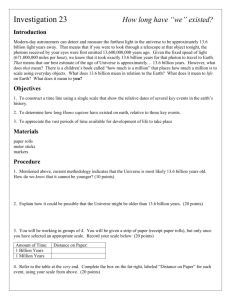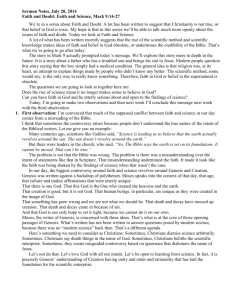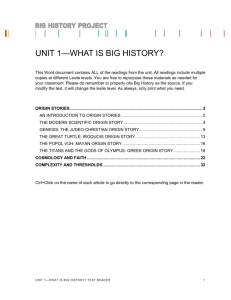Word doc - First Congregational United Church of Christ
advertisement
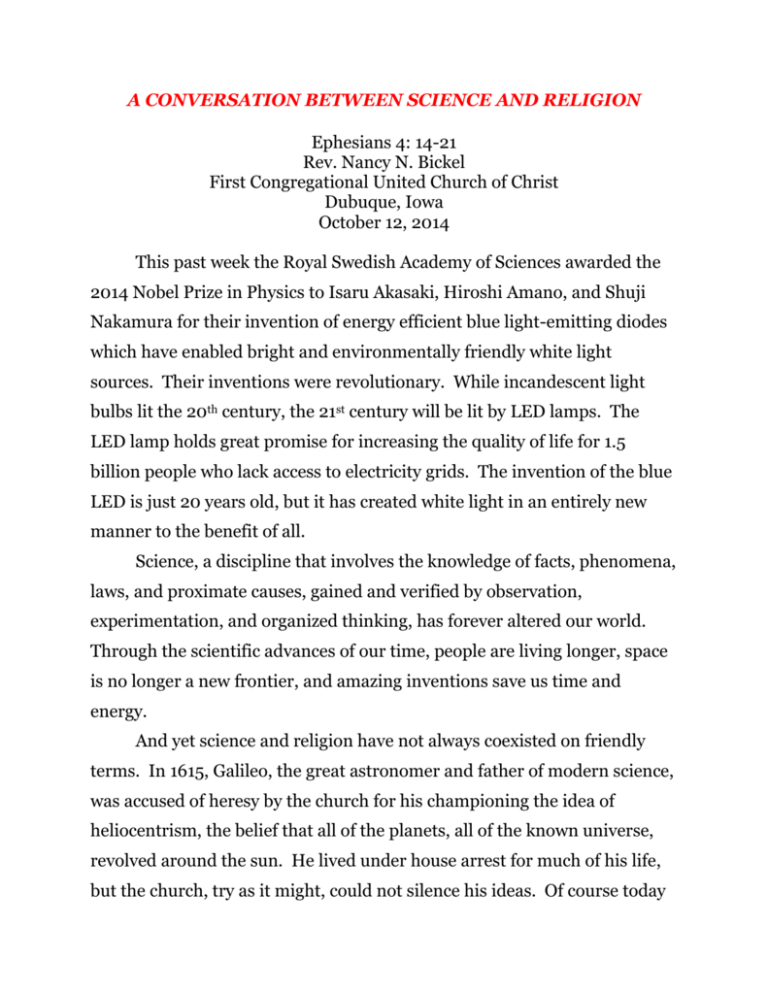
A CONVERSATION BETWEEN SCIENCE AND RELIGION Ephesians 4: 14-21 Rev. Nancy N. Bickel First Congregational United Church of Christ Dubuque, Iowa October 12, 2014 This past week the Royal Swedish Academy of Sciences awarded the 2014 Nobel Prize in Physics to Isaru Akasaki, Hiroshi Amano, and Shuji Nakamura for their invention of energy efficient blue light-emitting diodes which have enabled bright and environmentally friendly white light sources. Their inventions were revolutionary. While incandescent light bulbs lit the 20th century, the 21st century will be lit by LED lamps. The LED lamp holds great promise for increasing the quality of life for 1.5 billion people who lack access to electricity grids. The invention of the blue LED is just 20 years old, but it has created white light in an entirely new manner to the benefit of all. Science, a discipline that involves the knowledge of facts, phenomena, laws, and proximate causes, gained and verified by observation, experimentation, and organized thinking, has forever altered our world. Through the scientific advances of our time, people are living longer, space is no longer a new frontier, and amazing inventions save us time and energy. And yet science and religion have not always coexisted on friendly terms. In 1615, Galileo, the great astronomer and father of modern science, was accused of heresy by the church for his championing the idea of heliocentrism, the belief that all of the planets, all of the known universe, revolved around the sun. He lived under house arrest for much of his life, but the church, try as it might, could not silence his ideas. Of course today we all have learned from a young age that all of the planets revolve around the sun. As children of the enlightenment, we know that there are hundreds of scientific facts, backed up by research and data, which have proven true over time. We in the church cannot bury our heads in the sand to the astounding accumulation of knowledge that is all around us nor ought we feel threatened by science and thereby regard it as an enemy to the church. We in the United Church of Christ believe that learning of all kinds, including science, can be of great benefit to humankind and we ought not just coexist peacefully with it, we ought to encourage those who dedicate their lives to understanding our universe and those who inhabit it for understanding leads to innovation that can truly contribute to our quality of life. That being said, faith serves a vital role in asking the hard questions about scientific progress and providing the moral and ethical framework for decisions that affect the lives of the children of God. So I’d like to carry on a conversation this morning between the science we know to be true and the faith that we profess. Science says: Through the scientific advances of our time, we can see stunning images of deep space, black holes, new galaxies, an everexpanding universe. Science shows us a cosmos that gives birth to stars, to life, to mind and to self-consciousness. Mathematical equations have unraveled the secrets of the first seconds following the birth of our universe. We are realizing that we human beings are just one tiny part in a vast cosmic sea. At the same time, microscopic details of living cells show us the miraculous intricacies of our biological make up. Religion says: What we witness through these gifts of science evokes in us wonder and awe and humility as we continue to sing psalms of praise for the whole of creation. Psalm 19 says that the heavens are telling the glory of God; day to day pours forth speech and night to night declares knowledge. We continue to hear the words in Genesis of a God who created by speaking the universe into existence, of a God who continues to create. But we are also faced with a whole host of questions about ourselves and our place in the universe. Does the universe have a purpose? What does it mean to be human? Do other intelligent creatures exist somewhere beyond our solar system and, if so, does God love and care for them as God loves and cares for us? Science says: Although we humans possess the highest capacity for language, culture and technology, we now know that other species possess some of these capacities as well. We share their DNA and the functions of their brains. They communicate with each other and form strong social bonds. More and more we have come to understand how all of life, from intelligent forms to natural resources, are interconnected, how we are dependent on one another, how we might conserve or discover other resources. Religion says: While we are informed by science, we believe in God, not in some cosmic force or impersonal designer. We believe God can work through atoms and molecules; God can work tirelessly over eons, fashioning the most intricate of beings. We believe the universe was created with a purpose, for we trust in a loving God who is personal and relational, who seeks our companionship, who came in history as Christ incarnate, and whose life-giving spirit permeates all of creation, calling us to lives of thankfulness and justice. This great and bounteous God has created us in God’s image. We believe that God yearns for us to understand nature more fully so that we might love it more deeply. Science says: Evolution has taught us that as creatures we share a common origin with other species. Research has shown that human bodies and brains share the same genetic and biochemical processes with other creatures, not just mammals, but plants, and bacteria. We understand ourselves as evolved creatures. Each human being is the result of an incredibly complex process of biological development from a single cell to an embryo to the trillions of cells of the adult body. We have made huge medical advances as we have learned how to isolate cancer cells, and to treat new viruses. Stem cell research offers mind-boggling possibilities of overcoming diseases and prolonging human life. Religion says: Our faith is not built on clinging to ancient misconceptions or the worldviews of ancient cultures. Our faith is in the living God, who always goes ahead of us, speaking and creating. Gone are our old ideas of a small, static universe which limits God to being small and static. We believe that God creates in many ways and through many voices, even the provocative voice of evolution and cell development. Our creator works patiently, calling forth life, through chemical and biological processes spanning billions of years, waiting for us distinct creatures with the ability to think and act with freedom, creativity, passion and prayer. We honor those doctors and medical researchers who are inventing new treatments to eradicate cancers and finding cures for things like Alzheimer’s or Lou Gehrig’s that rob us of those we love. At the same time, we are concerned about the meaning of humanity at each stage of life. Medical technology raises new and troubling moral questions. What kind of slippery slope is it from creating life in a test tube to genetically engineering human life that strives for perfection. Many innovations are costly and therefore of benefit to just a few. In scientific fields where death is considered a failure, where do we draw the line in prolonging life to the point that the quantity of our days becomes more important than the quality? Science speaks: In recent years we have created new technologies that have enabled us to be in contact with people across our globe, order groceries delivered on line, buy a latte by scanning an app, reunite with friends from the past, and move freight from one place to another. The worldwide web gives us access to an unfathomable amount of information so that we can access data or facts in just seconds. On-line universities have afforded people the opportunity to get a college or graduate degree right from the comfort of their home. We have developed the ability to regulate our heat, check our appliances and see that our windows and doors are locked by the use of a cell phone, to turn on a faucet with the wave of a hand. Soon we will witness the production of cars with the ability to drive themselves. Drones provide us with state of the art surveillance and the ability to deliver weapon systems without putting boots on the ground. Religion says: As never before, the perspectives of faith and the powers of technology need to be brought together in a new, critical dialogue about the human future. In the end the ultimate question posed by technology is how it changes our outlook and our interactions in life. As a faithful people called to live in covenant relationship with God and others, are we trading our deep, face-to-face encounters with others with the anonymity and text communications over the internet? Will technology provide us with so much data at the drop of a hat that we will lose our ability to think, solve problems and make decisions? Will we control technology or will it at some time control us? Will the use of robotics make human labor meaningless and obsolete? If we wage war by drones in the Middle East, from a control room in Washington, DC, killing others with the push of a button, will the moral ambiguity that always comes into play on the battle field simply disappear? Science is sometimes unsettling because it destroys old ethical foundations without providing new ones. We cannot dismiss science because it provides rich benefits to our society, but the faith community must provide a moral compass lest we forfeit our humanity and technology becomes a new kind of savior. Science says: The changes that lie ahead of us can scarcely be imagined. But some of us confess that science and technology do not hold all of the answers for the future. A group of us, headed by Carl Sagan, made an appeal to religious leaders for help in raising global consciousness about our environment. Theologians are now almost routinely included in national conferences on genetics. We no longer think of the world as purely mechanical, devoid of consciousness, freedom and worth. Religion responds: Through astronomy we marvel at the age and vastness of the universe. Through physics we explore the fundamental nature of the stuff of creation and through chemistry and biology we see how matter is organized in sufficient complexity to be alive. Through evolution we learn of earth’s history and the possibilities of the future. Through technology we communicate around the world and into space. Through ecology we search for new forms of energy and find less destructive forms of agriculture. But in all of this, we must not seek to play God or to replace God, but humbly offer the work of our hands and minds in cooperation with God. As the apostle Paul says, love of Christ and our subsequent love for our neighbor always trumps our knowledge. Paul writes: “I pray that you may have the power to comprehend, with all the saints, what is the breadth and length and height and depth and to know the love of Christ that surpasses knowledge so that you may be filled with all the fullness of God.” But we, as people of faith, must engage our scientific culture, giving thanks for its amazing discoveries while acknowledging that God is still creating, continuing to ask the hard questions, proclaiming our faith in new and compelling language, to give us all a vision of healing and wellbeing to which God beckons the whole creation. I am indebted to the following papers published by the United Church of Christ: “An Unavoidable Challenge: Our Church in an Age of Science and Technology” by Ronald S. Cole-Turner “A New Voice Arising: A Pastoral Letter on Faith Engaging Science and Technology” by Rev. John Thomas and the United Church of Christ Science and Technology Network

